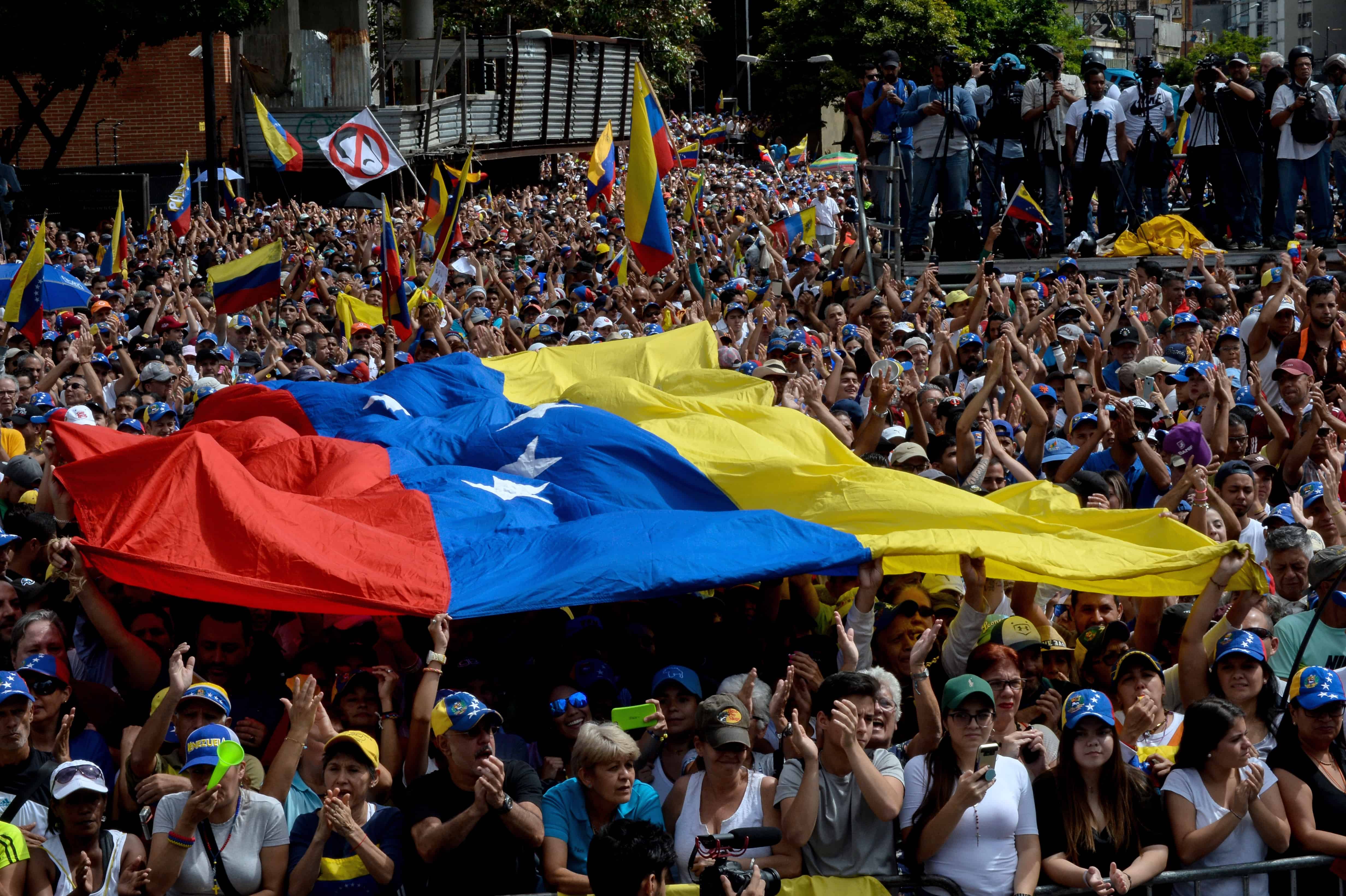Like millions, Eskeira turned her confidence in Juan Guaidó when he declared himself president of Venezuela. Six months after that oath, she carries the weight of disenchantment, as Nicolás Maduro is still in power.
In the portal of her house in Cúa (60 km south of Caracas), where she sells food under an umbrella, Eskeira says she went from hope to frustration as the boldness of Guaidó has been insufficient to displace Maduro, whom she blames for the economic devastation of the country.
“It is a mixture of impotence, fatigue, disenchantment,” says Eskeira Padrón, 47, still mourning the 2017 death of her father — reportedly due to a lack of medicine.
Six months of Guaidó’s interim presidency were reached Tuesday under the shadow of a new blackout that hit the entire country on Monday and still affects several regions.
“Hope went on vacation,” adds Eskeira, near a table where she offers beans, rice and pasta. She sells “everything that she can” but only earns enough “for half a meal” due to an inflation that, according to the IMF, will close this year at 10,000,000%.
Guaidó, head of the opposition party, proclaimed himself president before thousands of followers in a street in Caracas. His presidency is recognized by 50 countries, including the United States and Costa Rica.
He is commemorating the date with a legislative session and a rally, during which he summoned supporters to protest the blackout.
“Don’t give up!” said the 35-year-old engineer, who promises to expel Maduro this year “por las buenas o por las malas” to establish a transitional government and democratic elections.
‘Further from a solution’
After his oath, Guaidó led massive protests that have lost strength. Meanwhile, he tried to break the Armed Forces’ support of Maduro through an April 30 uprising and attempted to usurp international aid on Feb. 23 — but both operations failed.
“We have already left, and we have seen many people fall. There is hunger,” said Eskeira, who claims “international action” is needed because “in good times these people do not leave.”
In the park of neighboring Charallave, while working on business accounting, Gabriela Micó believes that today the country — which has large oil reserves — is “further from a solution” to the crisis.
She misses her 19-year-old daughter, who emigrated to Costa Rica four months ago because her salary was insufficient to meet inflation.
She says she has lost seven kilos (about 15 pounds) in a year because of anxiety and food shortages.
An intervention by the United States, which Donald Trump does not rule out, “does not seem like a good idea because innocent lives would be lost, but you start thinking and it seems that this is a solution,” confesses the 47-year-old woman.
According to the UN, four million Venezuelans have emigrated from the crisis since 2015.
Félix Seijas, director of the Delphos polling agency, observes “wear” among Venezuelans.
“Although people see hope in Guaidó, it is also true that every day they find less reason to go out because they feel that it contributes nothing,” he says.
Despite this, Guaido is by far the most popular opposition leader with 53% support, according to Delphos.
‘Paratrooper President’
After the rebellion of a small group of military personnel, which Guaidó said failed because hierarchs failed to comply with his word, the opponent agreed to negotiate with the government under the mediation of Norway in mid-May, without ruling out “military cooperation.”
The dialogues move forward with a secret agenda, although the main opposition demands are new elections.
“Here, there will be no presidential election; there will be election of the Parliament in 2020,” said Carlos González in Charallave, after an altercation with a man who insulted him for being a Chavista, a left-wing ideology that Delphos says encompasses 25% of the Venezuelans.
With a red cap of the government party and camouflage pants, Gonzalez, a 36-year-old construction assistant, calls Guaidó a “paratrooper president” and accuses him of seeking “conflict.”
He also believes Guaidó is trying to “destroy” Venezuela by supporting Washington’s sanctions, including an oil embargo since April.
González admits that his economic situation is difficult, but he predicts that Maduro will govern “until 2035” and trusts in the negotiation. Eskeira, on the other hand, believes that Guaidó’s big mistake “was to fall into the dialogue trap” after several failed operations.
According to Delphos, just over half of the population “looks forward to” the negotiations.
But Eskeira’s despair seems stronger. “It doesn’t matter if [the outcome] is extreme. What is higher than the price we are paying? If we continue like this, even our faith will go on vacation.”
This story was written in Spanish by Alexander Martinez / AFP and translated by The Tico Times.






